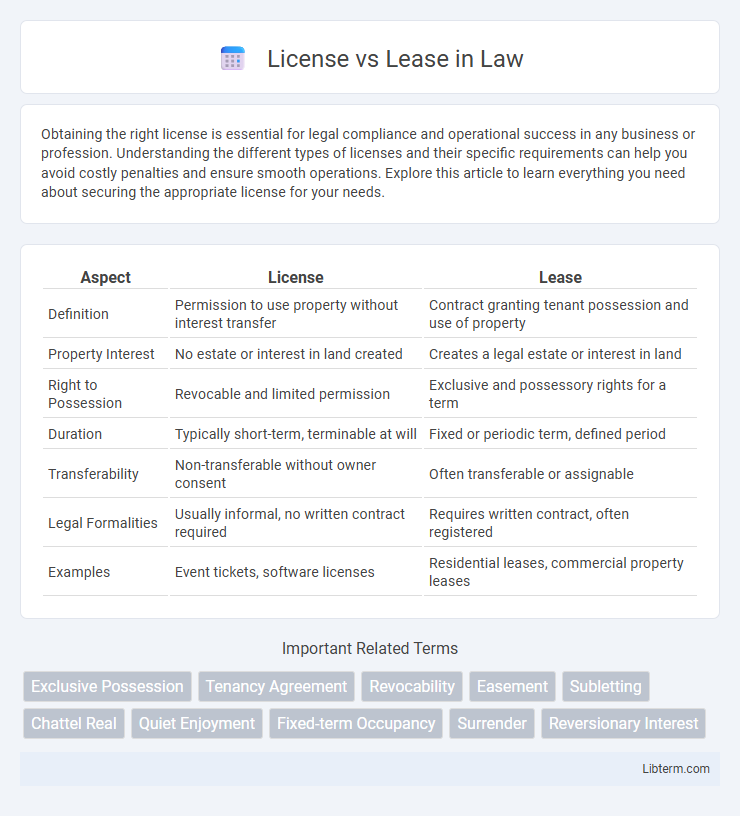Obtaining the right license is essential for legal compliance and operational success in any business or profession. Understanding the different types of licenses and their specific requirements can help you avoid costly penalties and ensure smooth operations. Explore this article to learn everything you need about securing the appropriate license for your needs.
Table of Comparison
| Aspect | License | Lease |
|---|---|---|
| Definition | Permission to use property without interest transfer | Contract granting tenant possession and use of property |
| Property Interest | No estate or interest in land created | Creates a legal estate or interest in land |
| Right to Possession | Revocable and limited permission | Exclusive and possessory rights for a term |
| Duration | Typically short-term, terminable at will | Fixed or periodic term, defined period |
| Transferability | Non-transferable without owner consent | Often transferable or assignable |
| Legal Formalities | Usually informal, no written contract required | Requires written contract, often registered |
| Examples | Event tickets, software licenses | Residential leases, commercial property leases |
Understanding License and Lease: Key Definitions
A license grants permission to use property without conferring ownership or exclusive possession, typically revocable and limited in scope. A lease constitutes a contractual agreement providing exclusive possession and use of property for a defined period, usually in exchange for rent. Understanding these distinctions clarifies legal rights and responsibilities in property agreements.
Legal Distinctions Between License and Lease
A license grants permission to use property without transferring any interest in the estate, often revocable and non-exclusive, whereas a lease conveys a possessory interest for a fixed term, providing the lessee exclusive possession and more substantial legal rights. Licensing agreements typically do not create a landlord-tenant relationship, making them less regulated under property and tenancy laws, unlike leases that involve formal landlord-tenant obligations and protections. Courts emphasize the intent and substance of arrangements to distinguish licenses from leases, focusing on exclusive possession, term certainty, and payment structure to determine the applicable legal framework.
Duration and Termination: License vs Lease
License agreements typically offer short-term use rights with flexible duration and easier termination options, allowing either party to end the agreement with minimal notice. Leases generally establish longer, fixed-term arrangements, often spanning months or years, and include more rigid termination clauses that require formal notice or penalty for early exit. The key distinction lies in the stability of occupancy rights, where leases provide greater security over the agreed period, while licenses prioritize adaptability and swift termination.
Rights and Obligations of Parties Involved
A license grants permission to use property without transferring ownership or exclusive possession, creating limited rights and typically revocable by the licensor. A lease conveys exclusive possession and control of property for a specified term in exchange for rent, establishing more substantial rights and obligations for both lessor and lessee. Leaseholders must maintain the property and pay rent timely, while licensors in license agreements face fewer ongoing duties beyond granting access.
Transferability and Assignment Issues
License agreements typically restrict transferability and prohibit assignment without the licensor's consent, ensuring tighter control over the use and sub-use of the licensed property. Lease agreements often allow assignment or sublease but usually require the lessor's approval, subject to terms specified in the lease contract. Transferability issues in licenses and leases impact the ability of parties to delegate rights or obligations, affecting flexibility and continuity in property usage or operations.
Payment Structures: License Fees vs Lease Rent
License agreements typically involve license fees that are paid as a fixed amount or periodic installments with less long-term commitment and often include flexibility in usage terms. Lease agreements require lease rent payments that are usually structured as regular, recurring charges over a defined lease term, often incorporating escalation clauses tied to inflation or market rates. The key difference lies in the financial obligation: license fees offer more adaptable payment options, while lease rent demands consistent, contractual payment schedules.
Use Cases: When to Choose a License or a Lease
Choose a license for flexible, short-term use of property or intellectual assets where control remains with the licensor and exclusivity is not required. Opt for a lease when a longer-term arrangement is needed with exclusive possession, often involving real estate or equipment. Licensing suits software, trademarks, and temporary venue access, while leasing fits residential, commercial properties, and durable goods requiring maintenance responsibilities.
Advantages and Disadvantages of License
A license offers flexible, short-term access to property without transferring ownership or creating a tenancy, allowing licensors to maintain control and easily revoke rights, which benefits businesses needing temporary space. However, licensees have limited security and fewer legal protections compared to leases, exposing them to sudden termination and potential operational disruptions. The informal nature of licenses reduces costs and negotiation time but introduces higher risk due to lack of exclusive possession or long-term stability.
Advantages and Disadvantages of Lease
A lease grants the lessee exclusive possession of a property for a fixed term, providing stability and control, which benefits businesses requiring long-term premises. The advantage of leases includes predictable costs and legal protections, but disadvantages involve less flexibility to terminate agreements early and potential liability for property maintenance. Compared to licenses, leases offer stronger tenant rights but require greater commitment and financial responsibility.
How to Decide: License or Lease for Your Needs
When deciding between a license and a lease, consider the duration and control you require; leases offer long-term possession and exclusive rights, while licenses provide temporary, revocable permission. Evaluate your purpose: leases suit residential or commercial tenants needing stability, whereas licenses fit short-term or flexible arrangements like event spaces. Assess legal protections and obligations, as leases typically grant stronger tenant rights and responsibilities compared to licenses.
License Infographic

 libterm.com
libterm.com